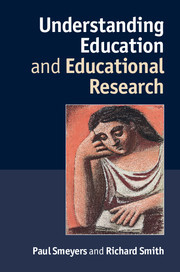Description
Understanding Education and Educational Research
Authors: Smeyers Paul, Smith Richard
Argues that good educational research is often in essence philosophical rather than a matter of conventional 'research methods'.
Language: English
Subject for Understanding Education and Educational Research:
Approximative price 72.37 €
In Print (Delivery period: 14 days).
Add to cart
Understanding Education and Educational Research
Publication date: 11-2014
227 p. · 15.6x23.5 cm · Hardback
Publication date: 11-2014
227 p. · 15.6x23.5 cm · Hardback
Approximative price 38.92 €
In Print (Delivery period: 14 days).
Add to cart
Understanding Education and Educational Research
Publication date: 11-2014
227 p. · 15x22.7 cm · Paperback
Publication date: 11-2014
227 p. · 15x22.7 cm · Paperback
Description
/li>Contents
/li>Biography
/li>
Educational research is widely believed to be essentially empirical, consisting mainly of collecting and analysing data, with randomised control trials as the 'gold standard'. This book argues that good educational research is often philosophical in nature. Offering a critical overview of the current state of educational research, the authors argue that there are two factors in particular that distort it. One is that throughout the world it is expected to serve the interests of the state in securing educational improvements, as measured by standardised examination results, and to demonstrate 'scientific' credentials sufficient to guarantee absence of ideological bias and carry conviction. The other is that learning to do educational research is generally seen as a matter of being trained in empirical 'research methods'. The authors demonstrate, by contrast, that good educational research needs the rigorous thinking characteristic of philosophy, and that philosophical treatments themselves sometimes constitute such research.
Introduction; 1. Education and its research; 2. The nature of social science; 3. The idea of method; 4. The nature of philosophy; 5. The art of research; 6. Language, truth, and meaning; 7. On the dominant nature of educational research and its shortcomings; 8. Research, policy and practical reasoning; 9. The limits of measurement; 10. Parenting and government intervention in the family (case study I); 11. Researching happiness and well-being (case study II); 12. Philosophy and research.
Paul Smeyers is Research Professor for Philosophy of Education at Ghent University and Extraordinary Professor at KU Leuven, both in Belgium, and Honorary Extraordinary Professor at Stellenbosch University, South Africa. He teaches philosophy of education and methodology of qualitative/interpretative research methods. He is President of the International Network of Philosophers of Education and link-convenor for Network 13, Philosophy of Education of the European Educational Research Association. Since January 2014 he has been the editor of Ethics and Education.
Richard Smith is Professor of Education at the University of Durham, where he teaches philosophy of social science and philosophy of education. He has been editor of the Journal of Philosophy of Education and was founding editor of the journal Ethics and Education.
Richard Smith is Professor of Education at the University of Durham, where he teaches philosophy of social science and philosophy of education. He has been editor of the Journal of Philosophy of Education and was founding editor of the journal Ethics and Education.
© 2024 LAVOISIER S.A.S.



